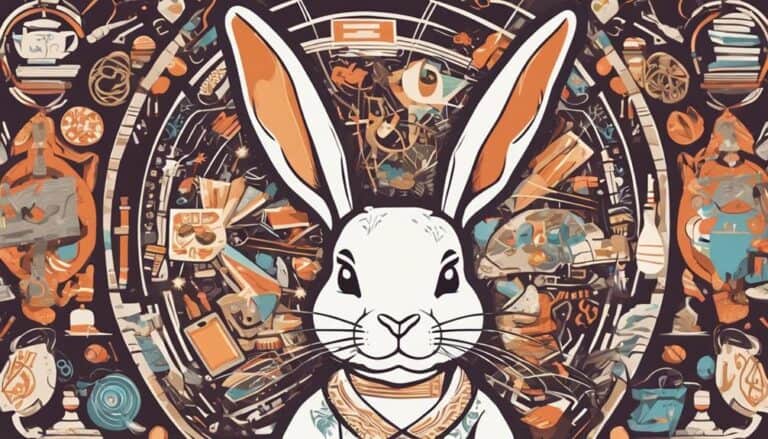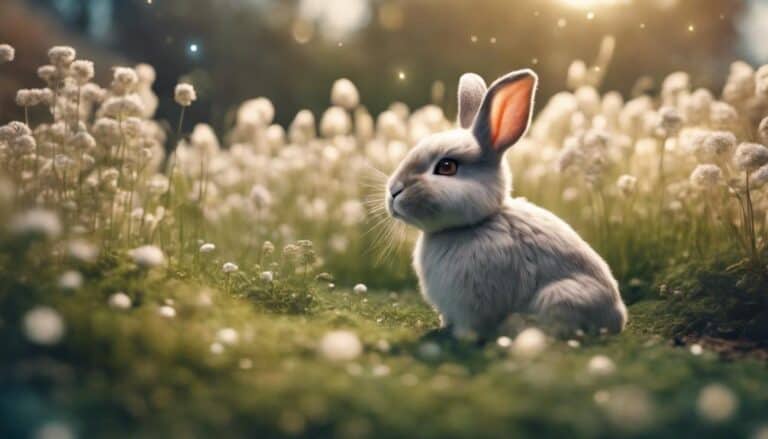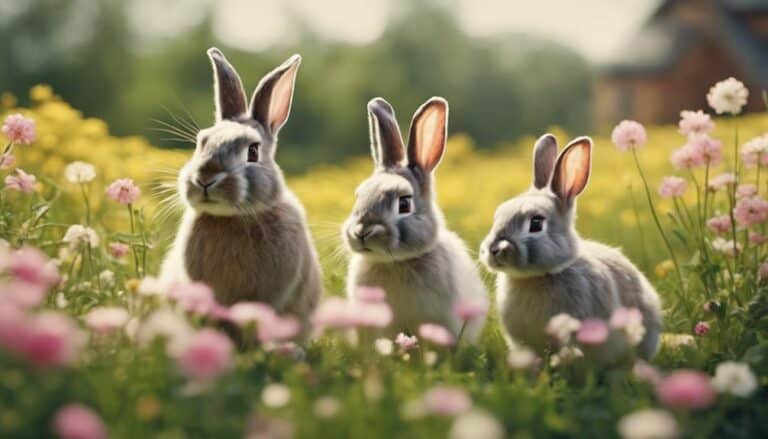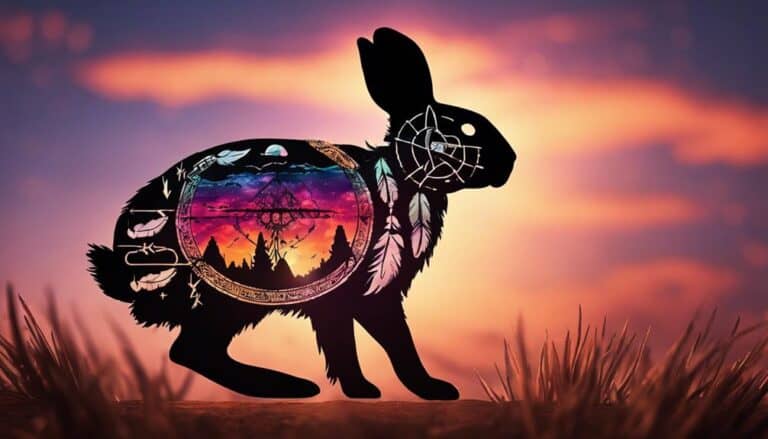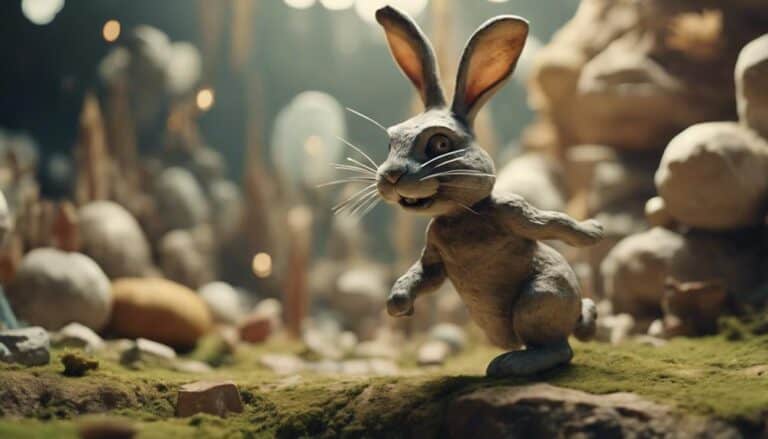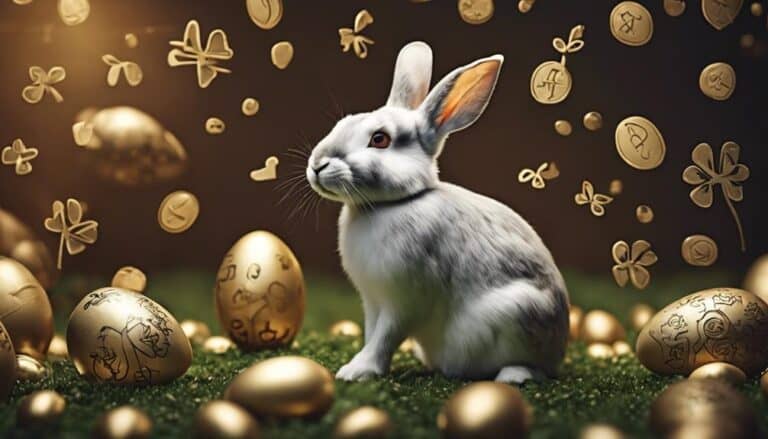If you've ever wondered why bunnies hop their way through pop culture, you're not alone. These fluffy creatures have burrowed deep into our hearts and minds, leaving a trail of significance that goes beyond their adorable exterior.
From their ancient symbolism to their modern-day representations, bunnies in pop culture have a tale to tell that might surprise you. So, why do these creatures continue to captivate audiences across the globe?
Let's explore the enduring impact and hidden meanings behind the bunny's presence in popular media.
Contents
- 1 Key Takeaways
- 2 Bunny Symbolism in Modern Popular Culture
- 3 Influence of Bunnies in Media
- 4 Evolution of Bunny Characters in Entertainment
- 5 Bunny Icons in Contemporary Culture
- 6 Impact of Bunnies on Fashion and Merchandise
- 7 Bunny References in Music and Art
- 8 Bunny Representation in Digital Age
- 9 Frequently Asked Questions
- 10 Conclusion
Key Takeaways
- Bunnies symbolize innocence, charm, and joy in pop culture.
- Bunny characters in media convey powerful messages and break stereotypes.
- The evolution of bunny characters reflects a cultural shift towards inclusivity.
- Bunnies have seamlessly integrated into online culture, adding cuteness and humor to digital platforms.
Bunny Symbolism in Modern Popular Culture
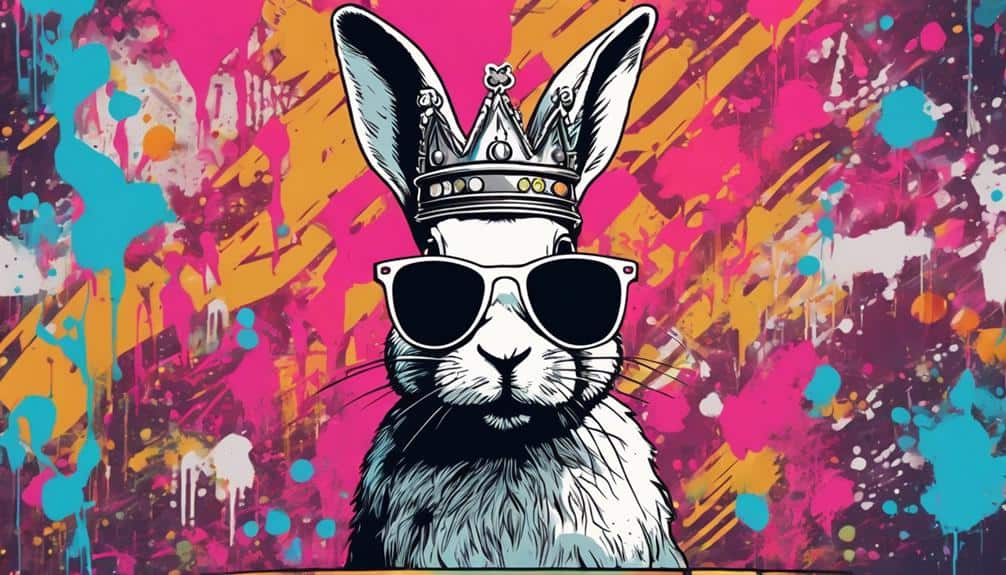
Have you ever wondered why bunnies hold such a significant role in modern popular culture? These adorable creatures have become powerful symbols of innocence, charm, and whimsy, enchanting audiences with their lovable and playful nature. In movies, TV shows, and commercials, bunnies are often portrayed as joyous beings, radiating positivity and spreading a sense of delight wherever they appear.
The bunny symbolism in modern pop culture reflects themes of joy, nostalgia, and positivity. Through their playful antics and endearing personalities, bunnies convey messages of hope, happiness, and lightheartedness to viewers of all ages. Their presence adds a touch of sweetness and magic to entertainment experiences, making them beloved icons in various media forms.
Influence of Bunnies in Media
Bunnies have undeniably left a lasting impact on various forms of media, becoming influential symbols that resonate with audiences worldwide. Here's how these bunny characters have made their mark:
- Bugs Bunny: A true cultural icon, Bugs Bunny has starred in over 160 cartoon shorts and is globally recognized as the ninth most portrayed film personality, showcasing his enduring popularity.
- White Rabbit: Popularized by the 1951 Disney animated film *Alice in Wonderland*, the White Rabbit symbolizes curiosity and spiritual awakening, enchanting audiences with its whimsical charm.
- Judy Hopps: Breaking stereotypes in *Zootopia*, Judy Hopps represents determination and positive change as a bunny police officer, inspiring viewers with her resilience against discrimination.
- Miffy: Created by Dick Bruna in 1955, Miffy's minimalist style has captivated preschoolers worldwide, especially in Japan, making her a beloved children's character with a timeless appeal.
These bunny characters haven't only entertained audiences but also conveyed powerful messages, making them integral to the media landscape.
Evolution of Bunny Characters in Entertainment
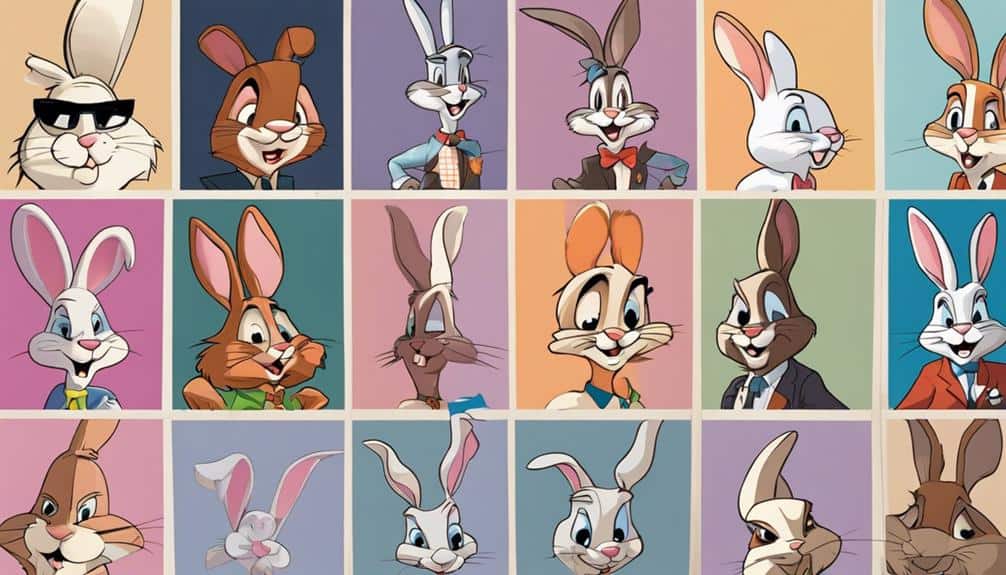
Bunny characters have undergone a remarkable transformation in entertainment. They've evolved from simple animated figures to complex cultural icons. They've shifted from mere comedic relief to powerful symbols challenging societal norms and stereotypes, enchanting audiences with their multifaceted roles.
The evolution of bunny characters in media reflects a broader cultural shift towards inclusivity, empowerment, and representation. This evolution shapes the way we perceive and engage with these beloved fictional creatures.
Bunny Icons in Media
The evolution of bunny characters in entertainment showcases a dynamic shift in cultural representation and storytelling, highlighting the enduring impact of these iconic figures on audiences worldwide.
- Bugs Bunny, a cultural icon with a Hollywood star, brought joy through over 160 cartoon shorts.
- The White Rabbit, from 'Alice in Wonderland,' symbolizes curiosity and spiritual awakening.
- Judy Hopps in 'Zootopia' embodies determination and positive change, defying discrimination.
- Miffy, a minimalist children's character, captivates preschoolers globally, especially in Japan.
These bunny icons haven't only entertained but also inspired generations, shaping the way we perceive animated characters and their roles in media. From classic tales to modern narratives, bunnies continue to hop into our hearts and minds, leaving a lasting impression on popular culture.
Bunny Roles in Films
Highlighting the transformative nature of bunny characters in cinematic history, their roles in films have evolved to shape and redefine storytelling in the entertainment industry.
Bugs Bunny, an iconic figure since his creation in 1940, has appeared in over 160 cartoon shorts, making him a beloved cultural icon.
The White Rabbit from Alice in Wonderland, symbolizing curiosity and spiritual awakening, gained widespread popularity through the 1951 Disney animated film.
Thumper from Bambi brought humor and wisdom to the screen, endearing himself to audiences as a fan-favorite character.
Judy Hopps, the brave and determined bunny police officer in Zootopia, challenged discrimination in the 2016 Disney film.
Lola Bunny, Bugs Bunny's love interest in Space Jam: A New Legacy, added a new dimension to the iconic character, showcasing the cultural significance of bunnies in films.
Bunny's Cultural Impact
With their evolving portrayals and widespread popularity, bunny characters in entertainment have greatly influenced cultural narratives and captivated audiences across generations.
Here's a glimpse into the evolution of bunny characters:
- Bugs Bunny: An American cultural icon created in 1940, starring in over 160 cartoon shorts.
- White Rabbit: Symbolizing curiosity in 'Alice in Wonderland,' sparking spiritual awakenings and popularizing the phrase 'down the rabbit hole.'
- Peter Rabbit: First appearing in 1902, an adventure-loving character translated into 36 languages and selling 45 million copies.
- Judy Hopps: Representing determination and defying discrimination as a bunny police officer in Disney's heartwarming 2016 film 'Zootopia'.
These characters showcase the diverse and impactful roles bunnies have played in shaping entertainment and cultural representation.
Bunny Icons in Contemporary Culture
In contemporary culture, bunny icons play a pivotal role in shaping narratives and representing diverse themes and values across various media platforms. These iconic bunnies have embedded themselves into our hearts and minds, each with a unique story to tell. Let's delve into a few of these beloved bunny characters in the table below:
| Bunny Icon | Year Introduced | Notable Traits |
|---|---|---|
| Bugs Bunny | 1940 | Clever, witty, and known for his catchphrase "What's up, Doc?" |
| White Rabbit | Alice in Wonderland | Symbolizes curiosity and serves as a metaphor for exploration |
| Peter Rabbit | 1902 | Adventure-loving, wears a blue jacket with brass buttons |
| Judy Hopps | Zootopia | Strong-willed police officer, symbolizes determination |
These bunny icons have transcended time and continue to captivate audiences with their endearing qualities and impactful stories, making them significant figures in contemporary pop culture.
Impact of Bunnies on Fashion and Merchandise
Bunnies have undeniably left a lasting mark on the world of fashion and merchandise, influencing trends and attracting consumers with their charm and appeal. Here's why they've become an integral part of the industry:
- Fashion Trends: Bunnies have influenced fashion trends with their cute and whimsical appeal, seen in clothing lines and accessories that captivate consumers seeking a touch of playfulness in their wardrobe.
- Popular Bunny-Themed Merchandise: Bunny-themed merchandise, ranging from clothing to home decor, is popular among consumers of all ages, reflecting the widespread love for these adorable creatures.
- Enduring Popularity: Designers and brands continue to incorporate bunny motifs into their collections, showcasing the enduring popularity of bunnies and their ability to stand the test of time in the world of merchandise.
- Diverse Industry Influence: Bunnies in pop culture not only inspire fashion but also extend their influence to diverse industries like beauty, lifestyle, and entertainment, proving their versatility and widespread appeal.
Bunny References in Music and Art
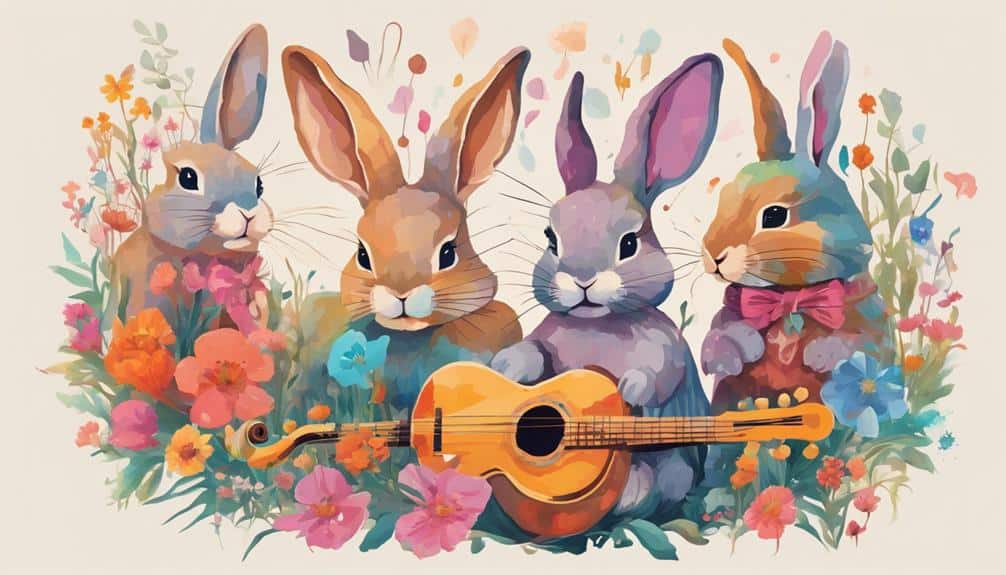
The influence of bunny references in music and art extends beyond mere symbolism, delving into themes of resilience, success, and inner strength that resonate with diverse audiences. In music, artists like Eddie Rabbit and B. Rabbit have incorporated rabbit references to convey powerful messages of perseverance and triumph. Eddie Rabbit's iconic song 'I Love a Rainy Night' captures a sense of nostalgia and joy, while B. Rabbit's portrayal in '8 Mile' illustrates the journey of overcoming obstacles to achieve success. These musical representations of rabbits serve as symbols of resilience and personal growth, inspiring listeners with lessons on determination and perseverance. Similarly, in art, rabbit symbolism is often used to depict themes of resilience and inner strength, showcasing the ability to overcome challenges and emerge stronger. The combination of music and art featuring rabbit references emphasizes the universal themes of resilience, success, and the triumph of the human spirit.
| Rabbit References in Music and Art |
|---|
| Eddie Rabbit's 'I Love a Rainy Night' evokes nostalgia and joy |
| B. Rabbit in '8 Mile' showcases overcoming challenges for success |
| Rabbit symbolism in music signifies perseverance and personal growth |
| Art featuring rabbits depicts themes of resilience and inner strength |
| Music and art highlight triumph over obstacles and perseverance |
Bunny Representation in Digital Age
Bunny representation in the digital age has evolved notably, with bunnies becoming icons in various online platforms. From bunny memes that bring humor to your feed, to bunny emojis that add a touch of cuteness to your messages, and even bunny filters on social media that let you embody these adorable creatures – bunnies have truly made their mark in the digital sphere.
Their presence in the digital age reflects a fusion of technology and creativity, showcasing how these furry creatures have seamlessly integrated into modern online culture.
Bunny Memes Online
In the domain of online humor and digital culture, bunny memes have emerged as a ubiquitous and endearing presence, mesmerizing audiences with their whimsical charm and relatable appeal.
Here are some insights into the world of bunny memes online:
- Bunny memes are widely popular on various social media platforms.
- These memes often feature humorous and relatable images and videos of bunnies.
- Bunny memes showcase bunnies in funny or cute situations, appealing to a broad audience.
- The use of bunny memes has become a prevalent form of internet humor, fostering a sense of community and amusement among users.
Bunny memes continue to spread joy and laughter in the digital age, connecting people through shared humor and admiration for these adorable creatures.
Bunny Emojis in Messaging
Shifting from the domain of bunny memes online, the prevalent use of bunny emojis in messaging signifies a seamless integration of bunny representation in the digital age. Bunny emojis are more than just cute icons; they convey feelings of playfulness, affection, and joy in your digital conversations.
Whether symbolizing Easter celebrations, the arrival of springtime, or simply adding a touch of whimsy, these emojis bring a sense of positivity to your messages. By incorporating bunny emojis, you infuse your texts with warmth and friendliness, creating a light-hearted and engaging tone.
The versatility of bunny emojis allows you to express excitement, happiness, and a sense of charm effortlessly, making them essential elements in modern communication platforms.
Bunny Filters on Social
The widespread adoption of bunny filters on social media platforms highlights their role in enhancing the visual appeal and interactivity of user-generated content.
- Bunny filters on Instagram and Snapchat offer users a cute and playful way to add bunny ears, noses, and whiskers to their photos and videos.
- These filters have gained popularity across all age groups for bringing a whimsical touch to selfies and posts.
- Animated effects like hopping ears and twitching noses amplify the fun factor of bunny filters, making content more engaging.
- Users can personalize their bunny filter experience by selecting from various color options, accessories, and animations, aligning with their unique style and preferences.
The enduring appeal of bunny filters as symbols of charm and playfulness persists in the digital age.
Frequently Asked Questions
What Is the Symbolism of a Bunny?
When you think of a bunny, you likely see more than just bunny ears. It embodies fertility, childhood innocence, and lucky charm. From Easter traditions to cartoon characters, bunnies captivate with their cute overload and speedy hop.
What Is the Meaning of the Bunnies in the Movie Us?
In a psychological thriller like "Us," the bunnies hold symbolic power, embodying the duality concept of light and shadow within the characters. They reflect family dynamics, childhood trauma, and identity crisis with eerie precision, adding depth to the dark comedy and horror elements.
What Is Significant About Rabbits?
In rabbit folklore, their diverse habitats showcase intelligence and communication. Bunny symbolism embodies care, companionship, and conservation efforts. Rabbit behavior highlights their significance, reflecting resilience, fertility, and a powerful connection to feminine power in pop culture.
What Does the Easter Bunny Have to Do With Jesus?
The Easter Bunny is often linked with Jesus due to shared timing around spring. Despite its origins in German folklore, this connection reflects cultural blending in Easter traditions, symbolizing renewal in both secular and religious contexts.
Conclusion
As you reflect on the significance of bunnies in pop culture, you can't deny their enduring impact on society. Like a kaleidoscope of colors, bunnies in media have painted a vibrant tapestry of resilience, creativity, and wisdom.
From Bugs Bunny's quick wit to Judy Hopps' unwavering determination, these iconic characters have hopped into our hearts, teaching us valuable lessons along the way.
So next time you see a bunny, remember the powerful symbolism they carry with them, like a hidden treasure waiting to be discovered.

